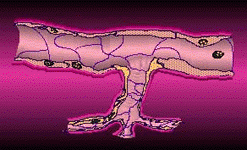
|
November 18, 1999
Based on New York Times article by Sheryl Gay Stolberg Banned in'60s, Thalidomide is best known as the morning-sickness drug, which was banned in the 1960s for causing horrible birth defects in children whose mothers used it during pregnancy. However, thalidomide has been reincarnated.
Thalidomide is not a classic anti-cancer drug; its actions do not appear directed at the rapidly dividing cells. Instead, thalidomide may be active against the blood vessel network that grows to support the cancer cells, a process called angiogenesis. Without the blood vessel support, the cancer regresses. This anti-angiogenic effect is one of the most fertile areas in cancer research today. The National Cancer Institute is sponsoring several clinical trials of potential anti-angiogenic compounds, and many other trials are being sponsored by industry. EntreMed, Inc. of Rockville, MD has two anti-angiogenic coupounds, Endostatin and Angiostatin, in clinical development. Compared to classic chemotherapy, the anti-angiogenic compounds are relatively non-toxic.
In an editorial accompanying the NEJM article, Drs. Raje and Anderson of the Dana Farber Cancer Institute in Boston conclude: "Given that the patients in the study had relapsed after chemotherapy, which was usually given in massive doses, this effect of thalidomide is indeed remarkable…. Current clinical studies of thalidomide open possibilities for novel treatments that target the tumor cell and its microenvironment." |
![]()
 In 1998,
In 1998,  The angiogenesis
story began with Dr. Judah Folkman, a Harvard surgeon, who in 1971 first
postulated the concept that cancers have two compartments, the cancer
cells and the supporting blood vessel network. (J Exp Med 133: 275-88,
1971). Subsequently, a variety of cancers,
The angiogenesis
story began with Dr. Judah Folkman, a Harvard surgeon, who in 1971 first
postulated the concept that cancers have two compartments, the cancer
cells and the supporting blood vessel network. (J Exp Med 133: 275-88,
1971). Subsequently, a variety of cancers,